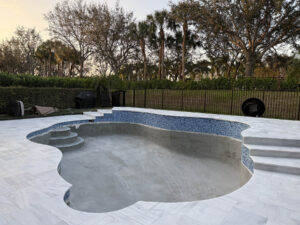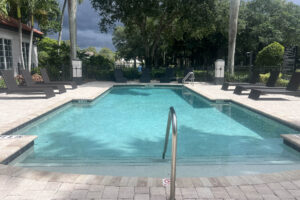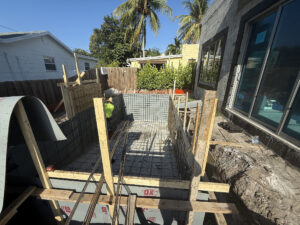Want to enjoy your pool but worried about the water temperature? Understanding how long it takes to heat a pool is crucial for comfortable swimming.
The time required to heat your pool can vary significantly depending on factors like pool size, heater type, and ambient temperature.
Did you know that a proper pool cover can reduce heating time by retaining warmth and reducing heat loss?
In this guide, we’ll provide essential insights into efficiently heating your pool so you can make the most of your swimming experience, no matter the season.
Keep The Pool Temperatures Comfortable, Not Chilly
Pool owners often worry about the water temperature because a swimming pool is meant to be entertaining and comfortable, not chilling to the bone.
While family members and guests may be eager to dive in, chilly waters can deter even the most enthusiastic swimmers.
Heating your pool ensures everyone can enjoy the water without discomfort.
The time required to warm your pool significantly depends on the weather. In the summer, especially in tropical climates like South Florida, you may not need a heater at all thanks to the naturally higher air temperatures.
However, for cooler days and evenings, options like eco-friendly heaters, solar heating, and solar pool covers can maintain warm temperatures effectively.
Considering adding a heater during your next pool remodeling in Palm Beach Gardens? It’s a smart move. A properly heated pool can transform chilly evenings into blissful, swim-ready moments.
Typically, an average-sized pool can take about 6 hours to heat with a standard heater, though this duration varies based on the pool’s volume and dimensions.
Factors Affecting Heating Efficiency:
- Initial Water Temperature: The starting temperature of your pool water influences the heating time. Colder water requires more energy and time to heat. With a powerful heater, however, you could warm your pool in just an hour, depending on its capacity.
- Type of Heating System: The choice of heating system is crucial and should be guided by professionals. Modern and efficient heaters can shorten the heating time significantly. It’s important to choose the right system, as many options are available, some of which can be costly—particularly in colder climates where the choice of heater is critical for effective heating.
- Pool Size and Water Volume: Larger pools with greater volumes of water naturally take longer to heat. The physical design and structure of your pool also play a role in determining how quickly it can be heated. While sunlight naturally warms the water, obstructions like trees or buildings can limit this effect. Ideally, pool water temperatures should be maintained between 78-82 degrees Fahrenheit for comfortable swimming. Sun rays warm the water, making it ideal for muscle relaxation and rehabilitation.
- Sunlight Exposure: Pool heaters make swimming exciting and comfortable for swimmers, so try to maximize the sun’s rays on the swimming pool so that the pool temperature rises. The water will heat up in the hours the sun shines on it so that it is tepid and warm, but this may not work if the pool is too large/deep or if it’s very cold out.
Heating Your Swimming Pool: Key Information
- Heating Time for Average-Sized Pools:
o An average-sized pool typically requires about 6 hours to increase in temperature by 10 degrees using a standard heater. The specific time can vary based on several factors including: -
-
- Type and size of the heater
- Specific heat capacity of the water
- Ambient temperature conditions
- Exposure to sunlight or shade
- Total volume of water in the pool
-
- Heating Duration by Pool Size:
o Small to medium-sized pools (approximately 15,000 gallons) can take anywhere from 24 to 72 hours to heat.
o Medium-sized pools (around 25-30,000 gallons) might need between 48 to 96 hours.
o Larger pools with more than 30,000 gallons of water typically require about 72 hours to two days. - Types of Heaters and Heating Times:
o Solar Heaters: Generally take about 1 to 1.5 days to adequately heat the pool.
o Electric Heaters: Can heat the pool to about 82 degrees Fahrenheit within 12 to 48 hours.
o Gas Heaters: Are the quickest, taking about 8 to 16 hours depending on the initial water temperature and external conditions.
Heating Estimates for Pools: For a typical 16 X 36 rectangular pool, heating times can vary widely, generally ranging from 6 to 48 hours to reach a comfortable swimming temperature. As we’ve learned, the duration depends on the heating method used, the starting temperature of the water, and external weather conditions.
Heater Efficiency and Pool Use: While some may experience their pool reaching the desired temperature by late afternoon if the heater is turned on in the morning, others might wait up to two days for their pool to warm up adequately. This variation underscores the importance of considering your specific pool and environmental factors when planning heating times. Use our guide to get as close as possible!
Economical Heating Tips: To maximize heat retention, especially during cooler days, many pool experts suggest using a pool cover. This method helps maintain the water’s warmth, keeps the pool clean, and reduces energy costs more effectively than investing in a larger, more expensive heater. A pool cover is a practical investment to extend your pool’s usability and manage heating expenses efficiently.
Contact Finn’s Pool Services for expert options and other pool services such as pool remodeling, pool maintenance, or pool resurfacing in Palm Beach Gardens.



